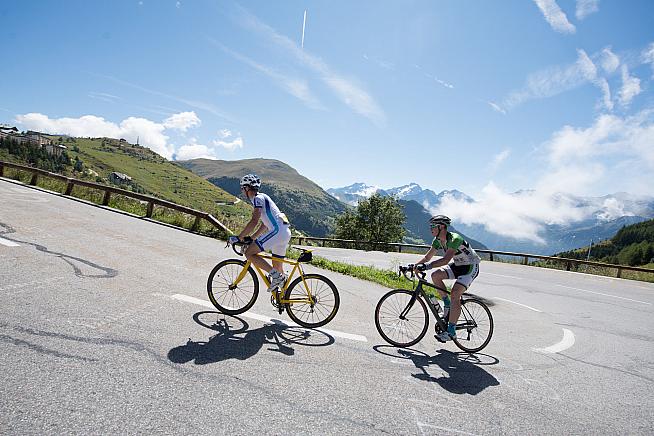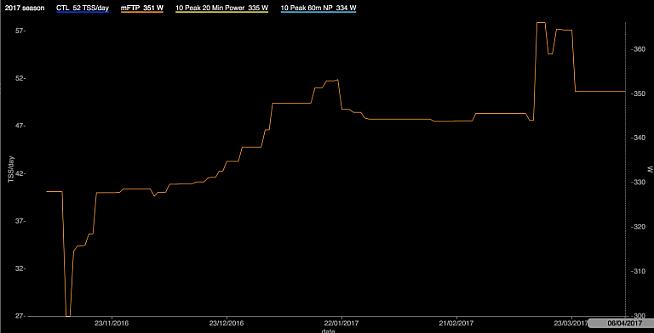Around this time of year I get a bunch of questions about POWER and what it actually means for people in the real world out riding their bikes.
There is a lot of science and engineering behind this but given that I neither have a PHD, and my only claim to being an engineer is owning a toolbox, I am not going to try and dazzle you with a lot of jargon just to make me look, on the surface, a lot cleverer than I am.
You need to generate power on a bike to overcome three primary forces:
-
Air resistance.
-
Rolling resistance.
-
Gravitational resistance.
If you add up all of those resistances (which I don't have a clue how to calculate) and multiply by speed you get power. So simply put, the more power you have the easier you will find it to overcome the three primary forces and that has to be a good thing if you want to get faster.

-
Turn your legs faster.
-
Turn a bigger gear.
Over the years the number of gears available to us has increased from......well none to lots. This means that you can now fine tune the trade off between how fast you want to pedal with how big a gear you want to turn. My job as a coach is to try and optimise and improve this for you so that your power, and hence speed increases over the course of a season.
I love this time of year as this is when all the hard work you have put in over the winter starts to bear fruit in terms of increased power. Below is a graph showing how one of my rider's power has improved over the course of this season.
The orange line is the rider's modelled FTP taking into consideration all the rides he has done this season. As you can see there was a steady build as we went through early season training, a bit of a plateau as we focussed more on sustainable power rather than new power peaks, before rising sharply again when we completed his third set of power tests for the season. We have also managed to increase time to exhaustion by 12 minutes. More power for longer durations is a winning combination.

Let's assume that conditions are constant and that the weight of the bike with bottles and rider (77kg/170lbs) are also the same. What time difference is there between 300w in January and 350w today?
Alpes D'Huez - 11.9km at an average gradient of 9%.
At 300w = 56 minutes
At 350w= 48 minutes
Sa Calobra - 9.4km at an average of 7%
At 300w = 36 minutes
At 350w= 31 minutes
These are pretty significant time differences and the steeper the gradient the more these differences are amplified. For those of you doing alpine events this year, taking in say four major cols, you could be SAVING UPWARDS OF 30 MINUTES if you now focus your training on PERFORMANCE and building POWER.
But what about weight I hear you shout? Yes there are definitely two sides to this equation especially on hill climbs but, and this is a massive BUT......if you are focusing your training on performance then you kinda have to accept the weight that you are currently at. You just can't significantly improve performance and lose weight at the same time. It just won't work. I have tried it and I can tell you it is a recipe for failure.
If you agree that significantly improving performance by building power is your main aim right now then take a look at our tried and tested 8 Week FTP Development Training Programme. I have designed this programme specifically for this time of year when you are a couple of months away from major events and want to significantly improve your performance. Its a bargain at just £20/$25 - I guarantee you it will the smallest amount of money you spend on getting faster this year. This programme has been proved to improve times on all types of events from time trails to sportives and hill climbs.
I hope that you take advantage of this offer and get your training focused on quality improving your PERFORMANCE. If you are interested in finding out more of the science and engineering behind this stuff and work out your own local climb times then this website is a great tool http://bikecalculator.com/index.html
Any questions then please email me at [email protected]
Rob Wakefield is a fully qualified Level 3 Cycling Coach with the Association of British Cycling Coaches and founder of Propello, a cycling focused health and fitness business delivering Performance Training Programmes and Bespoke Coaching to cyclists anywhere in the world.
All cyclists who are looking to improve their speed, endurance or strength will benefit from a structured training programme. Propello Training will improve how your muscles, lungs and heart work and will enable your body to transport and utilise fuel effectively - making you faster and stronger for longer.
Click here to learn more about Propello.
0 Comments







